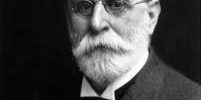
Warfield on the Divine Origin of the Bible
By Fred Zaspel
Frequently throughout his writings on the doctrine of Scripture B.B. Warfield emphasizes that we believe in the inspiration of Scripture simply because Jesus and his appointed apostles taught it. This for Warfield is the real issue and deciding factor in the question — We hold this doctrine on Jesus’ own authority. And of course he spends much time in the Scriptures demonstrating this obvious point.
In his “The Divine Origin of the Bible” (1882), however, Warfield surveys the corroborating evidence. If the Bible is indeed from God, then we should expect to see evidence of that fact in both its contents and its effects. And so he demonstrates that this is indeed the case.
Warfield begins by pointing out that the Bible is unique among all other books in the place it maintains among civilized people. Its influence on legislation, social habits, culture, governmental forms is unparalleled. It has left its mark in the shaping and even transformation of every quarter of every society to which it has gone. Religious rituals of sacrifice forever embedded in the consciousness of men and societies suddenly fell into neglect when brought into contact with the Bible. Religion and morals, in their practice and in their very theory, have been revolutionized by this unique book. Moreover, its influence has always been beneficient. This is not to deny the many abuses of professing Christians, but it is an unchallenged fact that where the Bible has gone society has improved, and love has replaced hate and horror. Following its first arrival, by all accounts attested to by miraculous signs, the Bible has deluged the world, crossing all boundaries and barriers. So pervasive has been its influence wherever it has gone, that it would be difficult to overstate the case. And all this has been accomplished without the commendation of royalty, against the most determined and violent opposition, and by means of the efforts of a dozen unlearned men bringing a message considered foolish by all who heard it. Yet all who are encountered by it are left with the deep-rooted conviction that this book is from God. If this is fanaticism, it is a remarkable fanaticism that has continued and grown in a way that is without precedent.
Warfield inquires as to what might account for all this if not the Bible’s own claim that it is of divine origin. Warfield proceeds by observing that it does not appear that the Bible, if of human origin only, could have been produced with the conscious intent of influencing the world as it has. The Bible is in fact not one but sixty-six books of virtually every genre, written by at least thirty different writers from all walks of life, education, and temperament, and scattered over a period of 1,500 years. Yet the Bible is not, as would be expected, a conglomerate of unrelated literary debris finally thrust together by some whirlpool of time. Rather, the Bible displays a remarkable unity in theme, in moral and religious ideal, in subject matter, and in its leading figure, Jesus Christ. Predictions and prophecy in the first half of the book are fulfilled so numerously and so exactly in the second half that the two are manifestly designed for the each other (implied: by a single mind). The former half manifestly anticipates and is completed by the latter, and the latter rests entirely upon the former. Each part contributes to the whole, and each book adds something of orderly and constantly progressive explanation, definition, or completion to the others. All of its parts very naturally dovetail together into a single well-connected and consistent whole. All of its parts seem clearly to be meant for the others, intentionally framed for its peculiar place. Although its production far outlasts the life span of any single man, the Bible seems by all accounts to be a book designed from the beginning to be what it is in its final form. All its varied parts fit together so well and so naturally that it appears to have been produced by a single mind. And yet what human mind could have guided this process over so many authors and so many centuries?
Moreover, the Bible displays not only a remarkable unity in its teaching, but the teaching itself is marked by a unique and otherwise unexplainable grandeur. The writers betray an advanced knowledge beyond their historical setting, an understanding of the universe that is in perfect accord with all that later, advanced learning has discovered. Their elevated conception of God, unprecedented in any other religious teaching before or since, and their correspondingly elevated conception of the nobility of man created in God’s image likewise cry for explanation. Still further, the great truths they present are not suited for their own time and culture only but are universal truths that are instinctively recognized by all to be true, divinely insightful, personally and universally relevant, and of eternal bearing.
And so again Warfield inquires, what can account for this? The evidence simply does not allow an accounting for the Bible apart from God. If this book cannot be accounted for apart from God, “we seem shut up to account for it as from him.”
Fred Zaspel holds a Ph.D. in historical theology from the Free University of Amsterdam. He is currently a pastor at the Reformed Baptist Church of Franconia, PA. He is also an Adjunct Professor of Systematic Theology at Calvary Baptist Seminary in Lansdale, PA. He is also the author of The Continuing Relevance of Divine Law (1991); The Theology of Fulfillment (1994); Jews, Gentiles, & the Goal of Redemptive History (1996); New Covenant Theology with Tom Wells (New Covenant Media); The Theology of B.B. Warfield: A Systematic Summary (Crossway, 2010). Fred is married to Kimberly and they have two children, Gina and Jim.

